| Listing 1 - 10 of 13 | << page >> |
Sort by
|
Book
ISBN: 9782359352405 2359352407 Year: 2018 Publisher: Limoges : Lambert-Lucas,
Abstract | Keywords | Export | Availability | Bookmark
 Loading...
Loading...Choose an application
- Reference Manager
- EndNote
- RefWorks (Direct export to RefWorks)
Discours indirect libre --- Rhétorique --- Discours indirect libre. --- Rhétorique. --- Free indirect speech. --- Discourse analysis, Literary. --- Indirect discourse in literature. --- Rhétorique. --- Rhetoric. --- rhetoric (discipline).
Book
ISBN: 9782359353402 2359353403 Year: 2021 Publisher: Limoges : Lambert-Lucas,
Abstract | Keywords | Export | Availability | Bookmark
 Loading...
Loading...Choose an application
- Reference Manager
- EndNote
- RefWorks (Direct export to RefWorks)
« Mélange de voix », « procédé littéraire », « forme de la modernité », « régime non marqué du discours rapporté », « phénomène aux frontières incertaines », « objet foncièrement interprétatif » - par ce type de jugements, qui lui sont régulièrement appliqués, le discours indirect libre est invariablement caractérisé au plan de ses effets, par principe liés à des contextes d'emploi particuliers. Dans une optique résolument différente, le présent ouvrage effectue un retour aux fondamentaux et livre une analyse de la structure interne du discours indirect libre : constituants linguistiques et fonctionnement énonciatif sont ainsi placés au centre de la réflexion.Sur la base d'une analyse nuancée de son système d'ancrage, le discours indirect libre est décrit - à l'encontre des conceptions théoriques et critiques actuellement dominantes - comme un dispositif énonciatif impliquant une seule voix, celle de l'énonciateur représenté. Corrélativement à cette structure univocale, une fonction spécifique se dégage : la schématisation stylisante du discours autre.
Discours indirect libre --- Enonciation (linguistique) --- analyse de discours --- linguistique --- Free indirect speech --- Speech acts (Linguistics) --- Discourse analysis --- Discours indirect libre. --- Stylistique. --- Énonciation (linguistique) --- Français (langue) --- Discours (linguistique).
Book
Year: 1975 Publisher: [Pôrto Alegre] : Pontificia Universidade Católica do Rio Grande do Sul, Instituto de Letras e Artes,
Abstract | Keywords | Export | Availability | Bookmark
 Loading...
Loading...Choose an application
- Reference Manager
- EndNote
- RefWorks (Direct export to RefWorks)
Argentine fiction --- Spanish language --- Free indirect speech. --- Roman argentin --- Espagnol (Langue) --- Discours indirect libre --- History and criticism. --- Style. --- Histoire et critique --- Stylistique
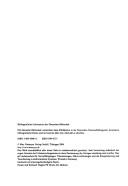
ISBN: 3484304855 311188306X 3110936895 Year: 2013 Volume: 485 Publisher: Tübingen : Max Niemeyer Verlag,
Abstract | Keywords | Export | Availability | Bookmark
 Loading...
Loading...Choose an application
- Reference Manager
- EndNote
- RefWorks (Direct export to RefWorks)
Die erlebte Rede im Deutschen und Polnischen wird im vorliegenden Buch nicht nur als Rede- oder Gedankenwiedergabe aufgefaßt, sondern wesentlich als ein textuelles Phänomen, das eines spezifischen narrativen Kontextes bedarf, in welchem der wiedergebende Sprecher ein Erzähler ist. Hauptgegenstand der Untersuchung ist die Raum- und Zeitreferenz in erlebter Rede. Die in diesem Zusammenhang betrachteten sprachlichen Ausdrucksmittel sind Temporaladverbiale, positionale und dimensionale Lokaladverbiale, die Tempora beider Sprachen und der Aspekt im Polnischen. Um die Kookkurrenzen zukunftsbezogener Temporaladverbiale mit Vergangenheitstempora (morgen war Weihnachten) sowie Vorkommen deiktischer Lokaladverbiale mitten in einem narrativen Text (die Bäckersfrau da drin) zu erklären, wird dafür plädiert, daß in erlebter Rede die deiktische Origo allein mit Hilfe sprachlicher Mittel (endophorisch) gesetzt werden kann, z.B. durch externe und interne Indikatoren mentaler Aktivitäten von Protagonisten. Der Gebrauch von Tempora wird vorwiegend unter dem Gesichtspunkt der Tempustransposition behandelt. Nach einer kritischen Durchsicht einiger Beschreibungen des deutschen Tempussystems wird gezeigt, daß dieses ausdifferenzierte Tempussystem regelmäßige Transpositionen ermöglicht. Dies wird durch die Einbeziehung des Polnischen verdeutlicht. Analysiert wird auch der Beitrag von Adverbialen und Tempora zur referenziellen Bewegung in Texten.
Discours indirect libre --- Free indirect speech --- Free indirect style --- Indirect speech [Free ] --- Speech [Free indirect ] --- Vrije indirecte rede --- Free indirect speech. --- German language --- Polish language --- Spoken German. --- Spoken Polish. --- Spoken German --- Spoken Polish --- Indirect speech, Free --- Speech, Free indirect --- Fiction --- Indirect discourse in literature --- Narration (Rhetoric) --- Technique
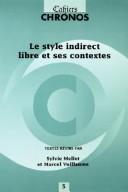
ISBN: 9042006609 9004454861 Year: 2000 Volume: 5 Publisher: Leiden; Boston : BRILL,
Abstract | Keywords | Export | Availability | Bookmark
 Loading...
Loading...Choose an application
- Reference Manager
- EndNote
- RefWorks (Direct export to RefWorks)
Il n'y a pas tout à fait un siècle que le style indirect libre a reçu son nom de baptême, mais sa date de naissance, s'il en a une, se perd dans la nuit des temps. Ce décalage n'est sans doute pas fortuit. Le SIL est, par essence, voué à une existence discrète, et il a fallu qu'il devienne un procédé littéraire consciemment et massivement utilisé par les romanciers du XIXème siècle pour qu'on s'intéresse à lui. Le présent volume est à la fois un retour aux sources, une mise en perspective et un questionnement. La contribution de Michèle Biraud et Sylvie Mellet nous parle du style indirect libre tel qu'on l'employait en grec et en latin, à une époque où il ne portait pas encore son nom. Marcel Vuillaume reprend et approfondit certains aspects un peu oubliés de la réflexion de Bally, qui, avec quelques autres, porta le SIL sur les fonts baptismaux. Quant à Laurence Rosier, elle retrace, dans la présentation de son récent ouvrage Le discours rapporté. Histoire, théories, pratiques, l'évolution de ce concept. Les trois autres articles, ceux de Michel Juillard, Anna Jaubert et Sylvie Mellet, tentent, chacun selon un angle d'attaque qui lui est propre, de renouveler ou de clarifier la problématique toujours ouverte du SIL. Ce recueil s'adresse donc à tous ceux, linguistes ou spécialistes de littérature, qui s'intéressent au SIL et, plus généralement, à tous les phénomènes qui relèvent de l'hétérogénéité énonciative.
Historical linguistics --- Stilistics --- Free indirect speech --- Discourse analysis --- French language --- Discours indirect libre --- Analyse du discours --- Français (Langue) --- Indirect discourse --- Discours indirect --- Français (Langue) --- Discours indirect libre. --- Indirect discourse.
Book
ISBN: 9789027200174 9789027264534 9027200173 9027264538 Year: 2017 Volume: 29 Publisher: Amsterdam Philadelphia
Abstract | Keywords | Export | Availability | Bookmark
 Loading...
Loading...Choose an application
- Reference Manager
- EndNote
- RefWorks (Direct export to RefWorks)
Free Indirect Style (FIS) is a linguistic technique that defies the logic of human subjectivity by enabling readers to directly observe the subjective experiences of third-person characters. This book consolidates the existing literary-linguistic scholarship on FIS into a theory that is based around one of its most important effects: consciousness representation. Modernist narratives exhibit intensified formal experimentation and a heightened concern with characters' conscious experience, and this provides an ideal context for exploring FIS and its implications for character consciousness. This book focuses on three novels that are central to the Modernist canon: Virginia Woolf's To the Lighthouse, D.H. Lawrence's The Rainbow and James Joyce's Ulysses. It applies the revised theory of FIS in close semantic analyses of the language in these narratives and combines stylistics with literary criticism, linking interpretations with linguistic features in distinct manifestations of the style.
Indirect discourse in literature. --- Fiction --- Modernism (Literature) --- Crepuscolarismo --- Literary movements --- Fiction writing --- Metafiction --- Writing, Fiction --- Authorship --- Discourse, Indirect, in literature --- Quotation --- Direct discourse in literature --- Free indirect speech --- Technique. --- Psycholinguistics --- Psychological study of literature --- English literature --- anno 1900-1999
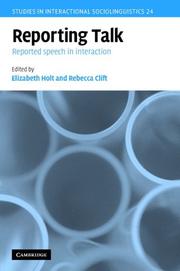
ISBN: 9780521824835 0521824834 9780511486654 9780521154567 0511334486 9780511334481 9780511335068 0511335067 051133382X 9780511333828 1107159938 9781107159938 1281040134 9781281040138 9786611040130 6611040137 1139130528 9781139130523 0511333145 9780511333149 0511486650 0521154561 Year: 2007 Volume: 24 Publisher: Cambridge New York Cambridge University Press
Abstract | Keywords | Export | Availability | Bookmark
 Loading...
Loading...Choose an application
- Reference Manager
- EndNote
- RefWorks (Direct export to RefWorks)
Reported speech, whereby we quote the words of others, is used in many different types of interaction. In this revealing study, a team of leading experts explore how reported speech is designed, the actions it is used to perform, and how it fits into the environments in which it is used. Using contemporary techniques of conversation analysis, the authors show how speech is reported in a wide range of contexts - including ordinary conversation, storytelling, news interviews, courtroom trials and medium-sitter interactions. Providing detailed analyses of reported speech in naturallyoccurring talk, the authors examine existing linguistic and sociological studies, and offer some insights into the phenomenon. Bringing together work from the most recent investigations in conversation analysis, this book will be invaluable to all those interested in the study of interaction, in particular how we report the speech of others, and the different forms this can take.
Sociolinguistics --- Pragmatics --- Oral communication. --- Conversation analysis. --- Free indirect speech. --- 316:800 --- 801.56 --- Sociolinguistiek --- Syntaxis. Semantiek --- 801.56 Syntaxis. Semantiek --- 316:800 Sociolinguistiek --- Conversation analysis --- Free indirect speech --- Oral communication --- Oral transmission --- Speech communication --- Verbal communication --- Communication --- Free indirect style --- Indirect speech, Free --- Speech, Free indirect --- Fiction --- Indirect discourse in literature --- Narration (Rhetoric) --- Analysis of conversation --- CA (Interpersonal communication) --- Conversational analysis --- Technique --- Arts and Humanities --- Language & Linguistics
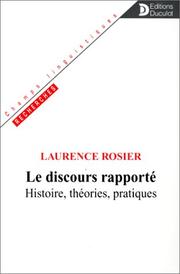
ISBN: 2801112054 9782801112052 Year: 1999 Volume: *16 Publisher: Paris ; Louvain-la-Neuve : Duculot,
Abstract | Keywords | Export | Availability | Bookmark
 Loading...
Loading...Choose an application
- Reference Manager
- EndNote
- RefWorks (Direct export to RefWorks)
French language --- Pragmatics --- Linguistique --- Taalkunde --- Grammar, Comparative and general --- Discourse analysis --- Discours indirect --- Français (Langue) --- Analyse du discours --- Indirect discourse --- Free indirect speech. --- Indirect discourse. --- Free indirect speech --- -#KVHA:Grammatica; Frans --- #KVHA:Linguistiek; Frans --- Comparative grammar --- Grammar --- Grammar, Philosophical --- Grammar, Universal --- Language and languages --- Philosophical grammar --- Linguistics --- Philology --- Free indirect style --- Indirect speech, Free --- Speech, Free indirect --- Fiction --- Indirect discourse in literature --- Narration (Rhetoric) --- Grammar, Comparative --- Technique --- Français (Langue) --- #KVHA:Grammatica; Frans --- Indirect discourse (Grammar) --- Indirect quotation (Grammar) --- Indirect speech (Grammar) --- Reported speech (Grammar) --- Indirect quotation --- Reported speech --- Indirect reason --- Grammar, Comparative and general - Indirect discourse.
Dissertation
ISBN: 919738951X Year: 2001 Publisher: Göteborg Göteborg university. Department of linguistics
Abstract | Keywords | Export | Availability | Bookmark
 Loading...
Loading...Choose an application
- Reference Manager
- EndNote
- RefWorks (Direct export to RefWorks)
Theses --- Free indirect speech. --- Grammar, Comparative and general --- Language acquisition. --- Speech. --- Indirect discourse. --- Free indirect speech --- Language acquisition --- Speech --- Talking --- Language and languages --- Oral communication --- Phonetics --- Voice --- Acquisition of language --- Developmental linguistics --- Developmental psycholinguistics --- Language development in children --- Psycholinguistics, Developmental --- Interpersonal communication in children --- Psycholinguistics --- Indirect discourse (Grammar) --- Indirect quotation (Grammar) --- Indirect speech (Grammar) --- Reported speech (Grammar) --- Discourse analysis --- Narration (Rhetoric) --- Free indirect style --- Indirect speech, Free --- Speech, Free indirect --- Fiction --- Indirect discourse in literature --- Indirect discourse --- Acquisition --- Indirect quotation --- Reported speech --- Technique --- Linguistics --- Philology
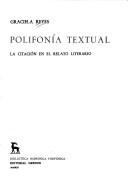
ISBN: 8424909720 8424909712 9788424909710 9788424909727 Year: 1984 Volume: 340 Publisher: Madrid : Gredos,
Abstract | Keywords | Export | Availability | Bookmark
 Loading...
Loading...Choose an application
- Reference Manager
- EndNote
- RefWorks (Direct export to RefWorks)
Fiction --- Spanish-American literature --- anno 1900-1999 --- Direct discourse in literature --- Discourse analysis, Literary --- Indirect discourse in literature --- Narration (Rhetoric) --- Discours direct dans la littérature --- Discours littéraire --- Roman --- Narration --- Technique --- Free indirect speech --- -Narration (Rhetoric) --- Literary discourse analysis --- Rhetoric --- Style, Literary --- Free indirect style --- Indirect speech, Free --- Speech, Free indirect --- Discourse, Indirect, in literature --- Quotation --- Discourse, Direct, in literature --- Narrative (Rhetoric) --- Narrative writing --- Discourse analysis, Narrative --- Narratees (Rhetoric) --- Metafiction --- Novellas (Short novels) --- Novels --- Stories --- Literature --- Novelists --- Philosophy --- Direct discourse in literature. --- Discourse analysis, Literary. --- Free indirect speech. --- Indirect discourse in literature. --- Technique. --- Narration (Rhetoric). --- Discours direct dans la littérature --- Discours littéraire --- Literary style --- Fiction writing --- Writing, Fiction --- Authorship --- Fiction - Technique --- LITTERATURE ESPAGNOLE --- CITATIONS
| Listing 1 - 10 of 13 | << page >> |
Sort by
|

 Search
Search Feedback
Feedback About UniCat
About UniCat  Help
Help News
News